How AI is (and isn’t) changing the way prospective students apply for university: a recap from ContentEd 2025
This year, we spoke to 97 people about how they searched for degrees and whether they had used AI tools in the process. I used these insights, along with data from GA4 and results from stress-testing various AI tools, to create a presentation for the 2025 ContentEd conference.
Initial research
In March 2025, our user experience specialist Pete ran some usability tests on the new undergraduate degree finder. During these tests, we took the opportunity to ask participants about their use of AI in the degree search.
I wrote about what we learned during these sessions – as well as what we discovered from analytics and stress-testing different AI tools – in a blog post which I published in March.
Is AI changing the way prospective students apply for university?
Since then, I’ve done more research with the team, using this as the basis of a presentation for the 2025 ContentEd conference, ‘How AI is (and isn’t) changing the way prospective students apply for university’, which I will recap here.
How AI is (and isn’t) changing the way prospective students apply for university (ContentEd)
How we gathered data and insights
During the March usability tests, we spoke to 19 prospective and current undergraduates about their use of AI.
We were able to speak to many more prospective undergraduates at an open day and to hear from a similar number of postgraduates after an online information event:
- For the open day, members of the team approached prospective undergraduates on campus and recorded short conversations about how they searched for degree programmes, whether they used AI during this process and – if so – what sort of tasks they carried out with AI.
- For the postgraduate event, Pete and I designed a short survey in Microsoft Forms, asking respondents about their use of AI during the degree search, including which AI tools they had used.
Following this research, I looked at analytics in GA4 with the help of our performance analyst Carla and carried out some stress-testing of various AI tools to find out what kinds of results our applicants might be getting back.
What we learnt
38% of people used AI tools to find information about universities and degrees
In total, we heard from 97 people (84 prospective and 13 current students):
- 38% said they had used AI tools to find information
- 62% said they had not used AI tools
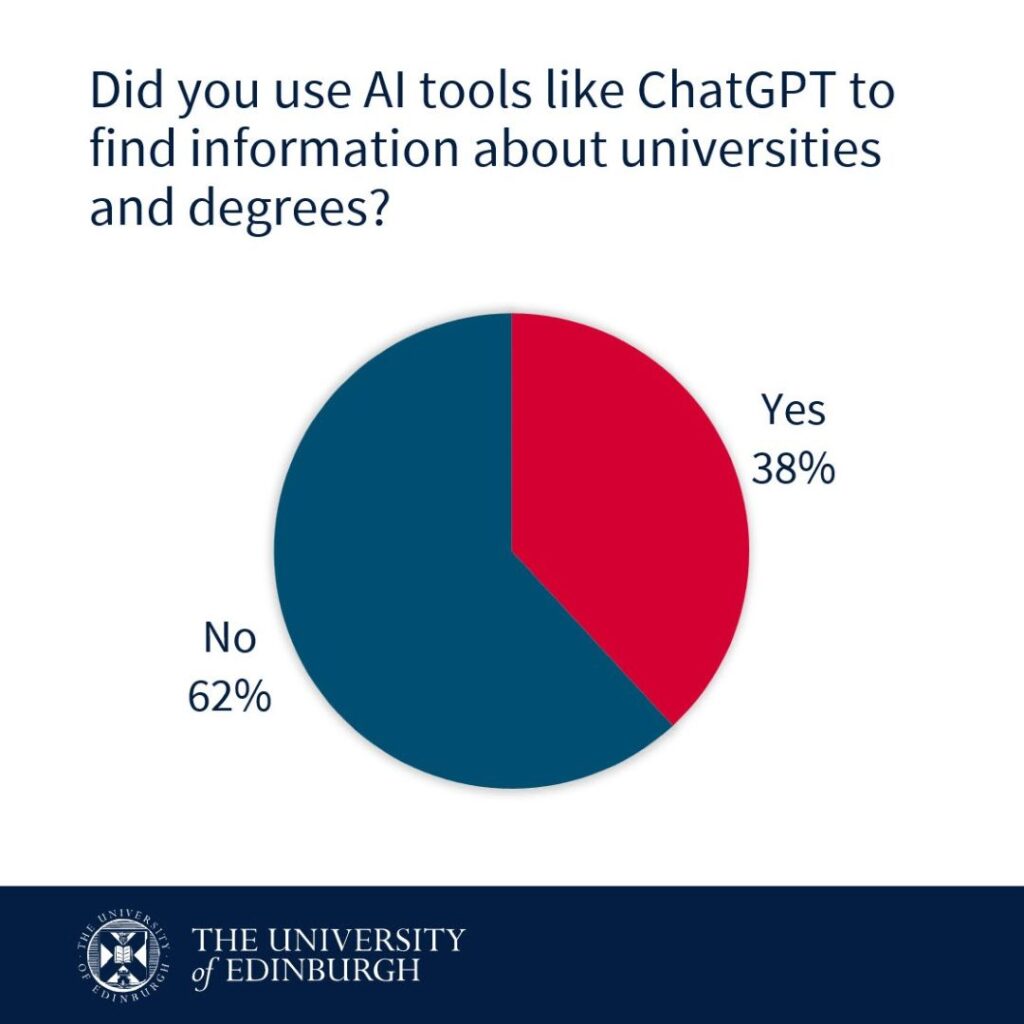
AI tools were more popular with postgraduates
Amongst postgraduates, 59% reported using AI in the degree search, compared to just 20% of undergraduates.
While we did not dig into this question with respondents, there are some reasons why this may be:
- The application journey is already very supported for undergraduates, with schools and parents heavily involved in research and decision-making.
- Established platforms like UCAS and Unifrog are the go-to for UK undergraduates when it comes to researching and preparing applications.
- Postgraduates are less likely to be living at home and influenced by parents, meaning research is more likely to be self-directed.
- There can be greater complexity to postgraduate study when it comes to study mode, delivery and funding options, requiring more complex and in-depth search queries.
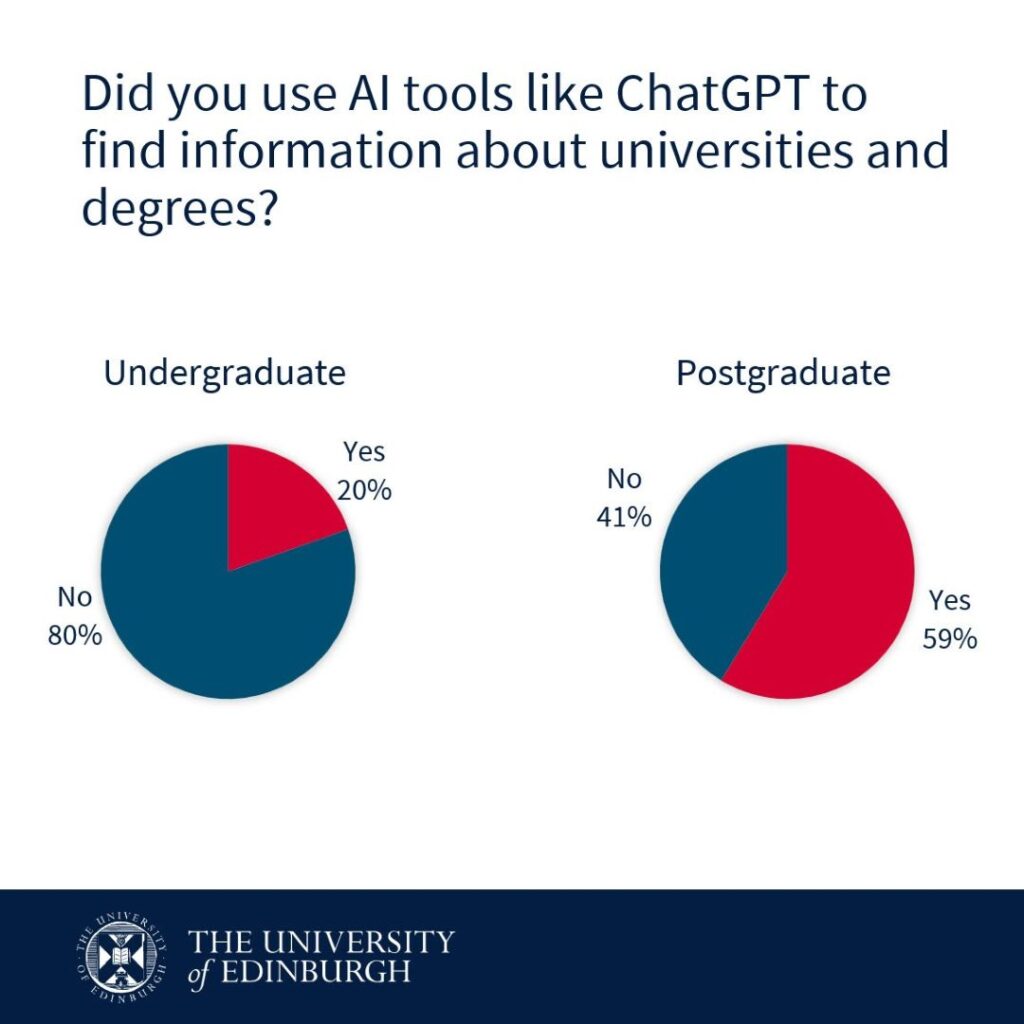
Most people do not trust AI completely
Many of the people we spoke to were reluctant to use AI tools at all, telling us things like “I won’t use it for university. It gets things wrong”.
Others were open to using it, and found it useful, but admitted that they nearly always needed to double check the information it sent back, usually on university websites.
Because the data is not up-to-date, I still need to deep dive in the university’s official website.
Using AI to list, rank and compare universities and degrees was a popular task
In the survey for postgraduates, we supplied a list of tasks and asked respondents to select any they carried out using an AI tool. ‘Comparing different degree programmes’ came top of the list, closely followed by ‘Entry requirements’ and ‘How to apply.’
This was also reflected in the conversations we had with respondents.
I would maybe just start off with quite simple prompts, like can you tell me all of the Russell Group universities which offer this degree?
Referrals from AI tools accounted for only 0.6% of visits to our website – but they are increasing
To help us track AI referrals, Carla created a dedicated ‘AI tools’ channel in GA4, tracking all referrals to the study.ed.ac.uk domain from tools such as ChatGPT, Google Gemini and CoPilot.
Between March and August 2025, referrals from AI tools accounted for just 0.6% of visits to our site, compared to 78% for organic search and 12.6% for direct.
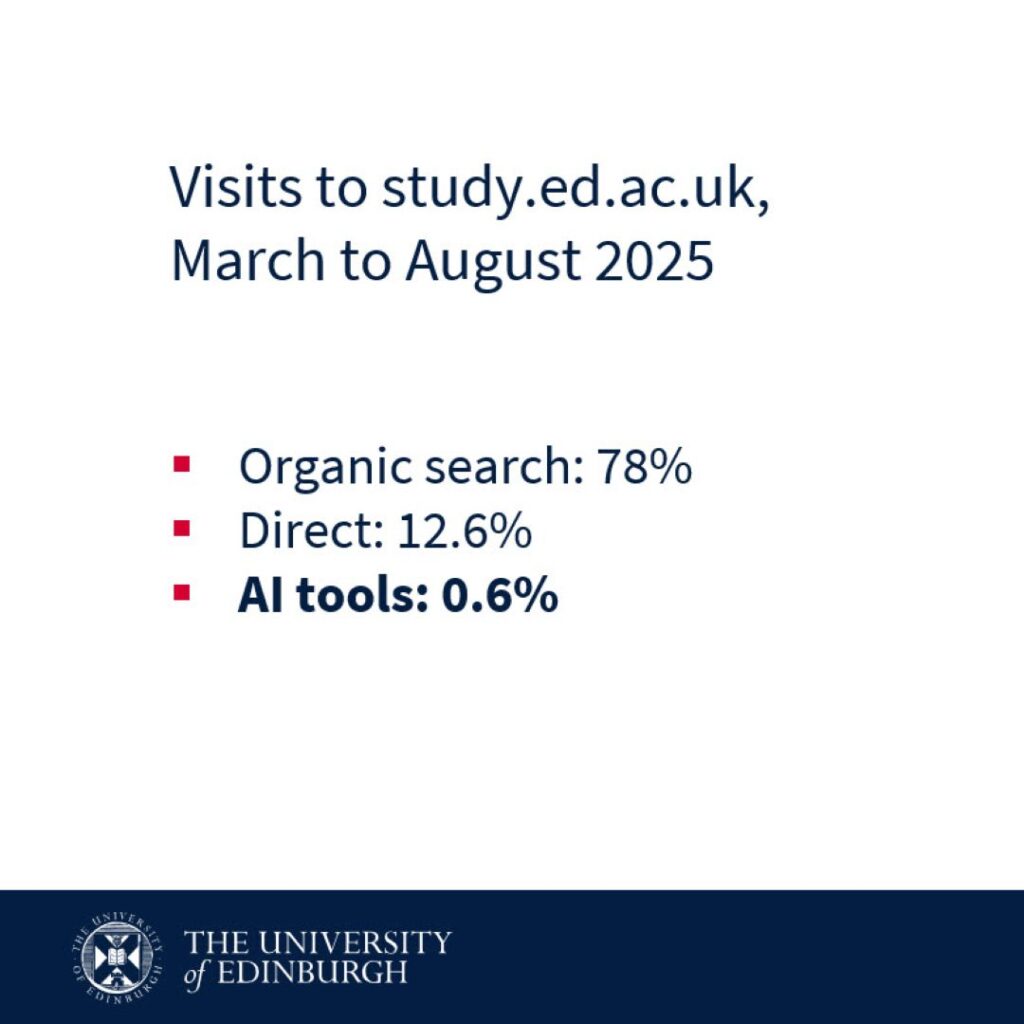
However, we did observe an upward trend across the period, with around 200 referrals in March increasing to around 1,300 in August.
There are a few caveats to note here:
- Referrals from Google’s AI Mode/AI Overview are currently included with organic search, which means the number of overall referrals from AI tools is probably higher than what is represented here.
- We can only track visitors to our website who accept our cookies, so again, we are not able to capture everyone.
- An increase in traffic in August is expected, as this is results and Clearing month.
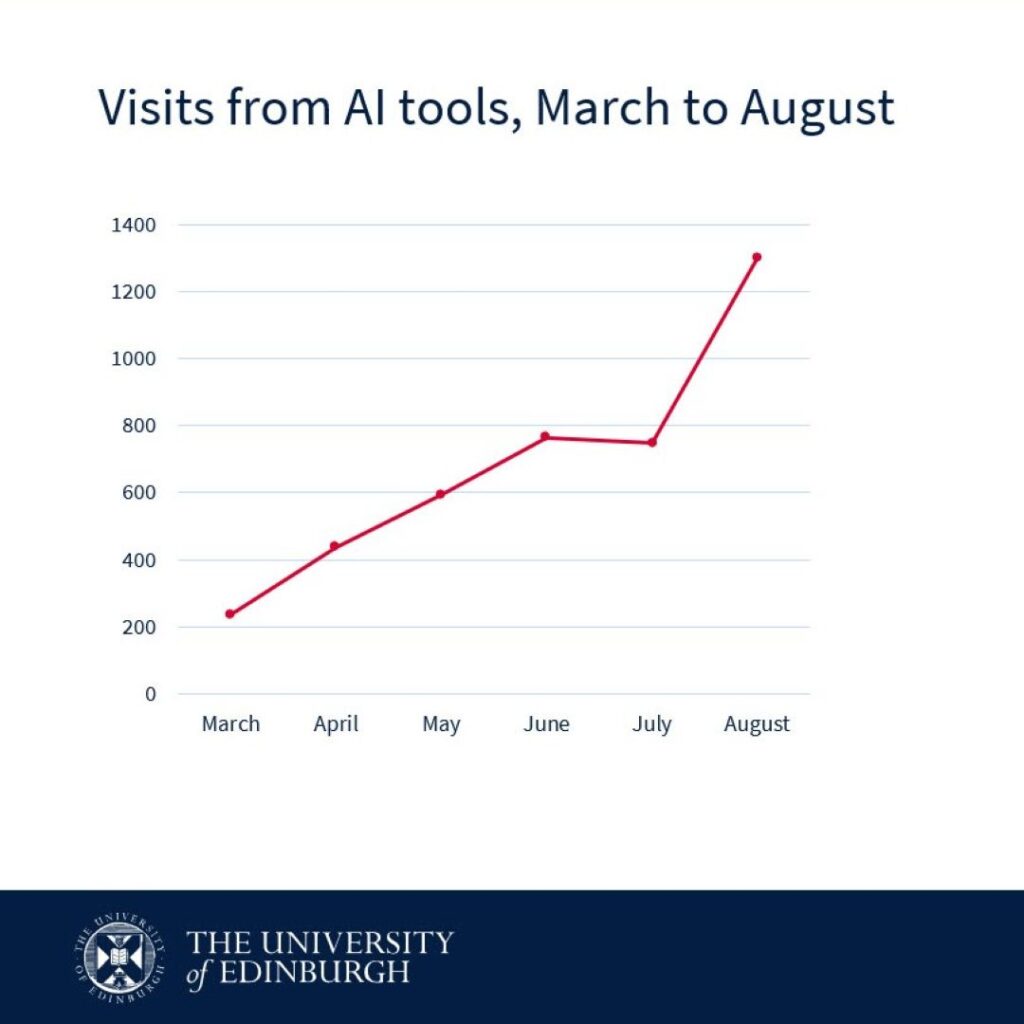
ChatGPT is (probably) the most popular AI tool
Within our AI tools channel, we found that ChatGPT was by far the most widely used tool, accounting for 94.5% of referrals during the period we looked at. Once again, we have to bear in mind that the list does not incorporate Google’s AI Mode/AI Overview (these numbers are included in organic search).
However, ChatGPT’s popularity was also reflected in the postgraduate survey.
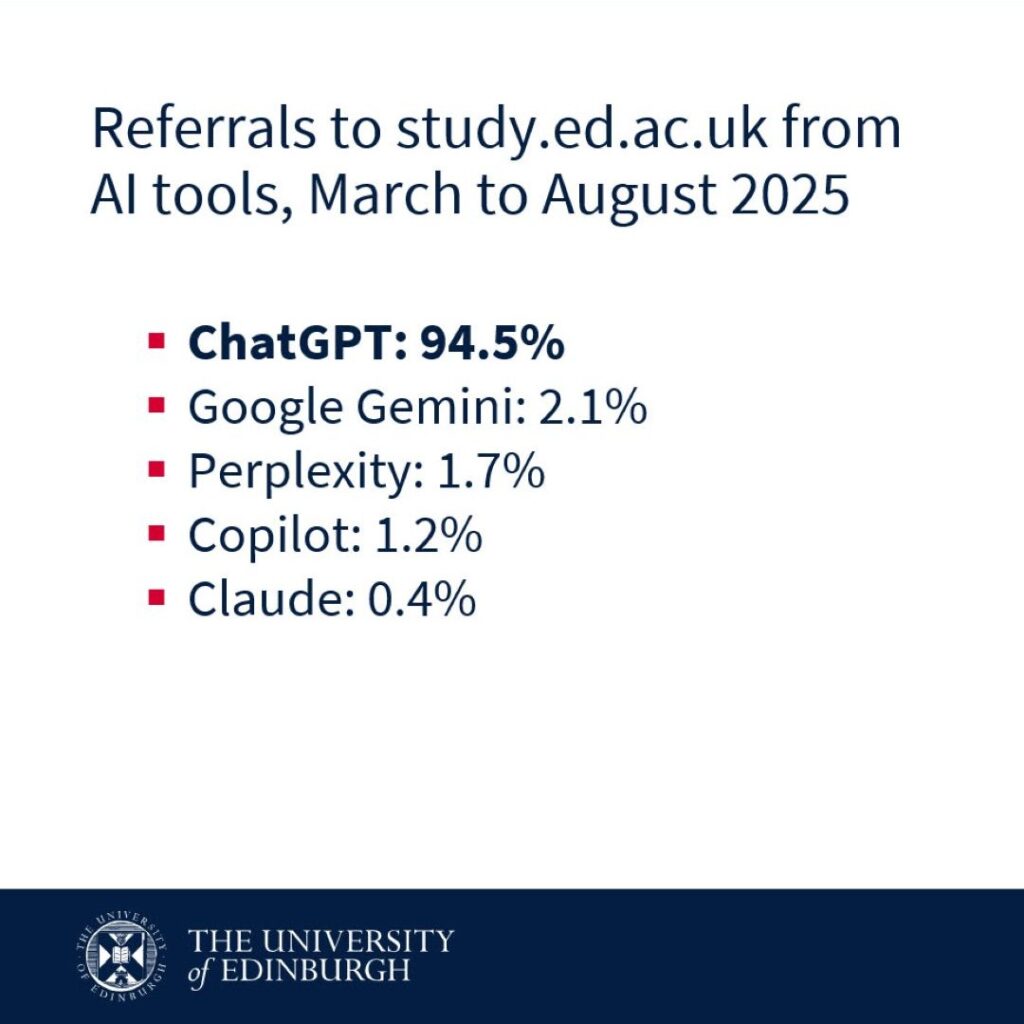
We aren’t seeing an overall downward trend in site visits
One concern with the rise of GenAI is that these tools will lead to fewer site visits, as users will answer their queries without ever having to click through to a website.
When we looked at traffic to the Edinburgh domain compared to last year, we did not observe a downward trend but this is something to keep an eye on in the long-term.
AI tools (still) can’t read entry requirements on our new degree finders
One of the big discoveries of our early testing, which I wrote about in my first blog post, was that AI tools cannot draw correct entry requirements from our new degree finders.
This is because the interface we designed requires the user to select their country and qualification type from two dropdown lists; until a user takes these actions, the required grades do not display on the page, making the information essentially invisible to any AI tools that come crawling.
With further stress-testing, some of the AI tools we tested were able to return the correct information, usually citing UCAS as their primary source.
Low-authority sources remain a problem
Although we did find that AI tools were able to pull correct entry requirements from the UCAS site, our stress-testing showed that they did not reliably do this all the time; citations for low-authority sources were rife.
The worst example of this was when ChatGPT returned incorrect entry requirements for a politics degree, and explained that it had sourced the information from the website of a private tutoring school based in Thailand.
When I asked why, I received a response explaining that the page was “accessible, easy to extract text from, and seemed to mirror official-looking wording” and that, rather than persist with finding a UCAS listing, ChatGPT had “prioritised quick access over source authority”.
Next steps for our team
Off the back of this research, our team will be focusing on the following over the coming months:
- finding a way to make dynamic elements like our entry requirements readable by AI tools
- continuing to track referrals from AI tools in GA4 (Carla has also found a way to separately track referrals from Google’s AI Mode/AI Overview, giving us a more accurate picture of overall numbers)
- continuing to make the case for centralisation: the smaller and more streamlined our web estate, the better the experience for users and AI tools alike
Get in touch if you’d like to chat more about this topic, or to share anything you have learned about AI use amongst applicants.



